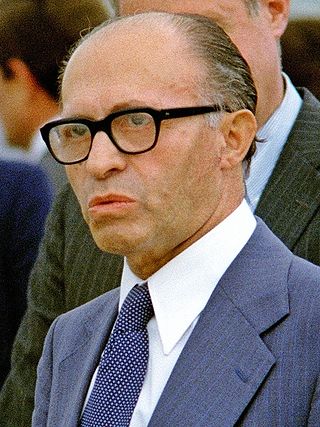
Menachem Begin was an Israeli politician, founder of Likud and the sixth Prime Minister of Israel.

Zionism is a nationalist movement that emerged in the 19th century to enable the establishment of a homeland for the Jewish people in Palestine, a region roughly corresponding to the Land of Israel in Jewish tradition. Following the establishment of the modern state of Israel, Zionism became an ideology that supports the development and protection of the State of Israel as a Jewish state.
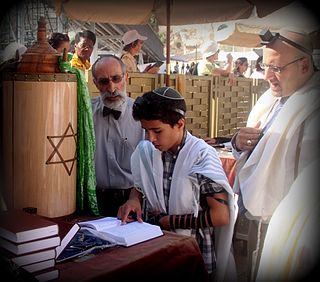
A bar mitzvah (masc.) or bat mitzvah (fem.) is a coming-of-age ritual in Judaism. According to Jewish law, before children reach a certain age, the parents are responsible for their child's actions. Once Jewish children reach that age, they are said to "become" b'nai mitzvah, at which point they begin to be held accountable for their own actions. Traditionally, the father of a bar or bat mitzvah offers thanks to God that he is no longer punished for his child's sins.

Kristallnacht (German pronunciation:[kʁɪsˈtalnaχt]lit. 'crystal night') or the Night of Broken Glass, also called the November pogrom(s) (German: Novemberpogrome, pronounced[noˈvɛm.bɐ.poˌɡʁoːmə] ), was a pogrom against Jews carried out by the Nazi Party's Sturmabteilung (SA) paramilitary and Schutzstaffel (SS) paramilitary forces along with some participation from the Hitler Youth and German civilians throughout Nazi Germany on 9–10 November 1938. The German authorities looked on without intervening. The euphemistic name Kristallnacht comes from the shards of broken glass that littered the streets after the windows of Jewish-owned stores, buildings, and synagogues were smashed. The pretext for the attacks was the assassination of the German diplomat Ernst vom Rath by Herschel Grynszpan, a 17-year-old German-born Polish Jew living in Paris.
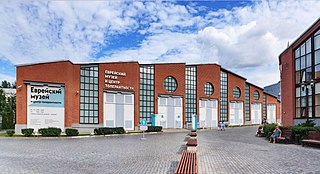
The history of the Jews in Russia and areas historically connected with it goes back at least 1,500 years. Jews in Russia have historically constituted a large religious and ethnic diaspora; the Russian Empire at one time hosted the largest population of Jews in the world. Within these territories, the primarily Ashkenazi Jewish communities of many different areas flourished and developed many of modern Judaism's most distinctive theological and cultural traditions, while also facing periods of antisemitic discriminatory policies and persecution, including violent pogroms. Some have described a "renaissance" in the Jewish community inside Russia since the beginning of the 21st century; however, the Russian Jewish population has experienced precipitous decline since the dissolution of the USSR which continues to this day, although it is still among the largest in Europe.

Revisionist Zionism is a form of Zionism characterized by territorial maximalism. Revisionist Zionism promoted expansionism and the establishment of a Jewish majority on both sides of the Jordan River.

The Religious Zionist Party, known as Tkuma until 2021 and officially known as National Union–Tkuma, was a far-right, ultra-nationalist, Jewish supremacist, and religious Zionist political party in Israel. In all the elections since its founding in 1998, the party had joined other factions and competed as part of a united list. In 2023, the Religious Zionist Party and The Jewish Home agreed to merge to become National Religious Party–Religious Zionism.
Jewish political movements refer to the organized efforts of Jews to build their own political parties or otherwise represent their interest in politics outside the Jewish community. From the time of the siege of Jerusalem by the Romans to the foundation of Israel the Jewish people had no territory, and, until the 19th century they by-and-large were also denied equal rights in the countries in which they lived. Thus, until the 19th century effort for the emancipation of the Jews, almost all Jewish political struggles were internal, and dealt primarily with either religious issues or issues of a particular Jewish community.

The Nuremberg Laws were antisemitic and racist laws that were enacted in Nazi Germany on 15 September 1935, at a special meeting of the Reichstag convened during the annual Nuremberg Rally of the Nazi Party. The two laws were the Law for the Protection of German Blood and German Honour, which forbade marriages and extramarital intercourse between Jews and Germans and the employment of German females under 45 in Jewish households; and the Reich Citizenship Law, which declared that only those of German or related blood were eligible to be Reich citizens. The remainder were classed as state subjects without any citizenship rights. A supplementary decree outlining the definition of who was Jewish was passed on 14 November, and the Reich Citizenship Law officially came into force on that date. The laws were expanded on 26 November 1935 to include Romani and Black people. This supplementary decree defined Romanis as "enemies of the race-based state", the same category as Jews.

The Jewish Home was an Orthodox Jewish, religious Zionist and far-right political party in Israel. It was originally formed by a merger of the National Religious Party, Moledet and Tkuma in November 2008. However, Moledet broke away from the party after its top representative was placed only 17th on the new party's list for the 2009 Knesset elections, and instead ran on a joint list with Hatikva. Tkuma later also left to join the National Union.
The Jewish Labour Movement (JLM), known as Poale Zion (Great Britain) from 1903 to 2004, is one of the oldest socialist societies affiliated to the UK Labour Party. It is a member of the progressive coalition of Avodah/Meretz/Arzenu/Ameinu within the World Zionist Organization. Its sister parties are the Israeli Labor Party (Havodah) and Meretz.
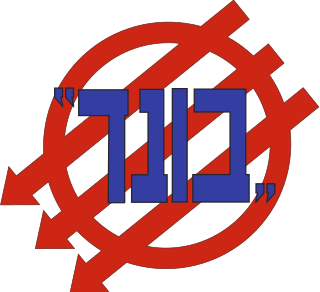
The General Jewish Labour Bund in Poland was a Jewish socialist party in Poland which promoted the political, cultural and social autonomy of Jewish workers, sought to combat antisemitism and was generally opposed to Zionism.
The relationship between Judaism and politics is a historically complex subject, and has evolved over time concurrently with both changes within Jewish society and religious practice, and changes in the general society of places where Jewish people live. In particular, Jewish political thought can be split into four major eras: Biblical, Rabbinic, Medieval, and Modern.

Otzma Yehudit or Jewish Power is a far-right political party in Israel, which has been referred to as Kahanist and anti-Arab. It was originally formed as Otzma LeYisrael, on 13 November 2012 by MKs Aryeh Eldad and Michael Ben-Ari, who split from the National Union to form a new party ahead of the 2013 elections.
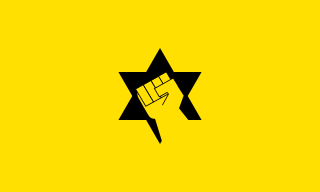
Kahanism is a religious Zionist ideology based on the views of Rabbi Meir Kahane, founder of the Jewish Defense League and the Kach party in Israel.

The Jewish left consists of Jews who identify with, or support, left-wing or left-liberal causes, consciously as Jews, either as individuals or through organizations. There is no one organization or movement which constitutes the Jewish left, however. Jews have been major forces in the history of the labor movement, the settlement house movement, the women's rights movement, anti-racist and anti-colonialist work, and anti-fascist and anti-capitalist organizations of many forms in Europe, the United States, Australia, Algeria, Iraq, Ethiopia, South Africa, and modern-day Israel. Jews have a history of involvement in anarchism, socialism, Marxism, and Western liberalism. Although the expression "on the left" covers a range of politics, many well-known figures "on the left" have been of Jews who were born into Jewish families and have various degrees of connection to Jewish communities, Jewish culture, Jewish tradition, or the Jewish religion in its many variants.

Poale Zion was a movement of Marxist–Zionist Jewish workers founded in various cities of Poland, Europe and the Russian Empire at about the turn of the 20th century after the Bund rejected Zionism in 1901.
Labor Zionism or socialist Zionism refers to the left-wing, socialist variation of Zionism. For many years, it was the most significant tendency among Zionists and Zionist organizations, and was seen as the Zionist sector of the historic Jewish labour movements of Eastern Europe and Central Europe, eventually developing local units in most countries with sizable Jewish populations. Unlike the "political Zionist" tendency founded by Theodor Herzl and advocated by Chaim Weizmann, Labor Zionists did not believe that a Jewish state would be created by simply appealing to the international community or to powerful nations such as the United Kingdom, Germany, or the former Ottoman Empire. Rather, they believed that a Jewish state could only be created through the efforts of the Jewish working class making aliyah to the Land of Israel and raising a country through the creation of a Labor Jewish society with rural kibbutzim and moshavim, and an urban Jewish Proletariat.

The General Jewish Labour Bund in Lithuania, Poland and Russia, generally called The Bund or the Jewish Labour Bund, was a secular Jewish socialist party initially formed in the Russian Empire and active between 1897 and 1920. In 1917 the Bund organizations in Poland seceded from the Russian Bund and created a new Polish General Jewish Labour Bund which continued to operate in Poland in the years between the two world wars. The majority faction of the Russian Bund was dissolved in 1921 and incorporated into the Communist Party. Other remnants of the Bund endured in various countries. A member of the Bund was called a Bundist.
There have been instances of antisemitism within the Labour Party of the United Kingdom (UK) since its establishment. Notable occurrences include canards about "Jewish finance" during the Boer War and antisemitic remarks from leading Labour politician Ernest Bevin. In the 2000s, controversies arose over comments made by Labour politicians regarding an alleged "Jewish lobby", a comparison by London Labour politician Ken Livingstone of a Jewish journalist to a concentration camp guard, and a 2005 Labour attack on Jewish Conservative Party politician Michael Howard.














